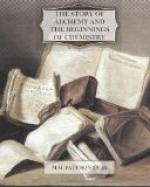The same author says: “There is a substance of a metalline species which looks so cloudy that the universe will have nothing to do with it. Its visible form is vile; it defiles metalline bodies, and no one can readily imagine that the pearly drink of bright Phoebus should spring from thence. Its components are a most pure and tender mercury, a dry incarcerate sulphur, which binds it and restrains fluxation.... Know this subject, it is the sure basis of all our secrets.... To deal plainly, it is the child of Saturn, of mean price and great venom.... It is not malleable, though metalline. Its colour is sable, with intermixed argent which mark the sable fields with veins of glittering argent.”
In trying to attach definite meanings to the alchemical accounts of Principles, Elements, and the One Thing, and the directions which the alchemists give for changing one substance into others, we are very apt to be misled by the use of such an expression as the transmutation of the elements. To a chemist that phrase means the change of an element into another element, an element being a definite substance, which no one has been able to produce by the combination of two or more substances unlike itself, or to separate into two or more substances unlike itself. But whatever may have been the alchemical meaning of the word element, it was certainly not that given to the same word to-day. Nor did the word transmutation mean to the alchemist what it means to the chemist.
The facts which are known at present concerning the elements make unthinkable such a change as that of lead into silver; but new facts may be discovered which will make possible the separation of lead into things unlike itself, and the production of silver by the combination of some of these constituents of lead. The alchemist supposed he knew such facts as enabled him not only to form a mental picture of the change of lead into silver, or tin into gold, but also to assert that such changes must necessarily happen, and to accomplish them. Although we are quite sure that the alchemist’s facts were only imaginings, we ought not to blame him for his reasoning on what he took to be facts.
Every metal is now said to be an element, in the modern meaning of that word: the alchemist regarded the metals as composite substances; but he also thought of them as more simple than many other things. Hence, if he was able to transmute one metal into another, he would have strong evidence in support of his general conception of the unity of all things. And, as transmutation meant, to the alchemist, the bringing of a substance to the condition of greatest perfection possible for that substance, his view of the unity of nature might be said to be proved if he succeeded in changing one of the metals, one of these comparatively simple substances, into the most perfect of all metals, that is, into gold.
The transmutation of the baser metals into gold thus came to be the practical test of the justness of the alchemical scheme of things.




